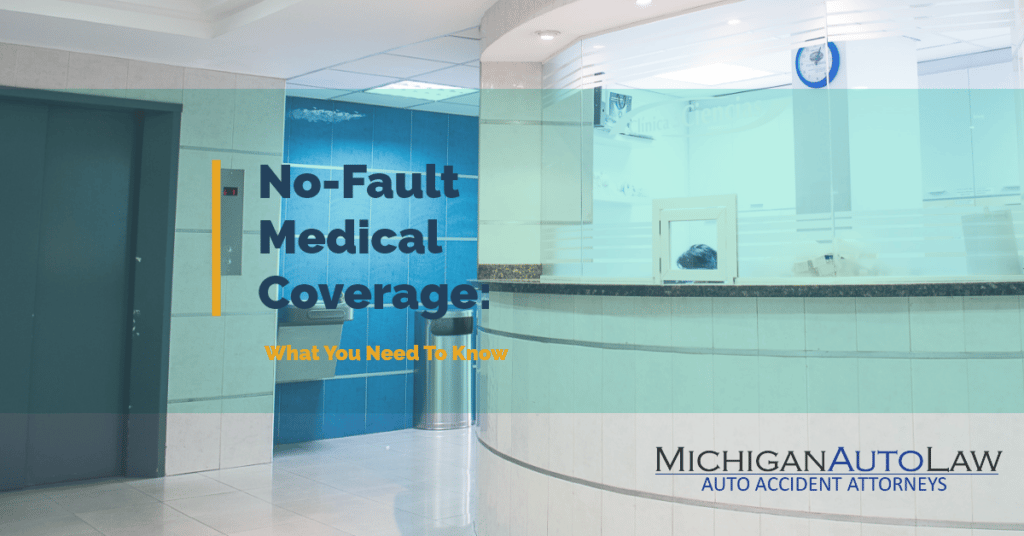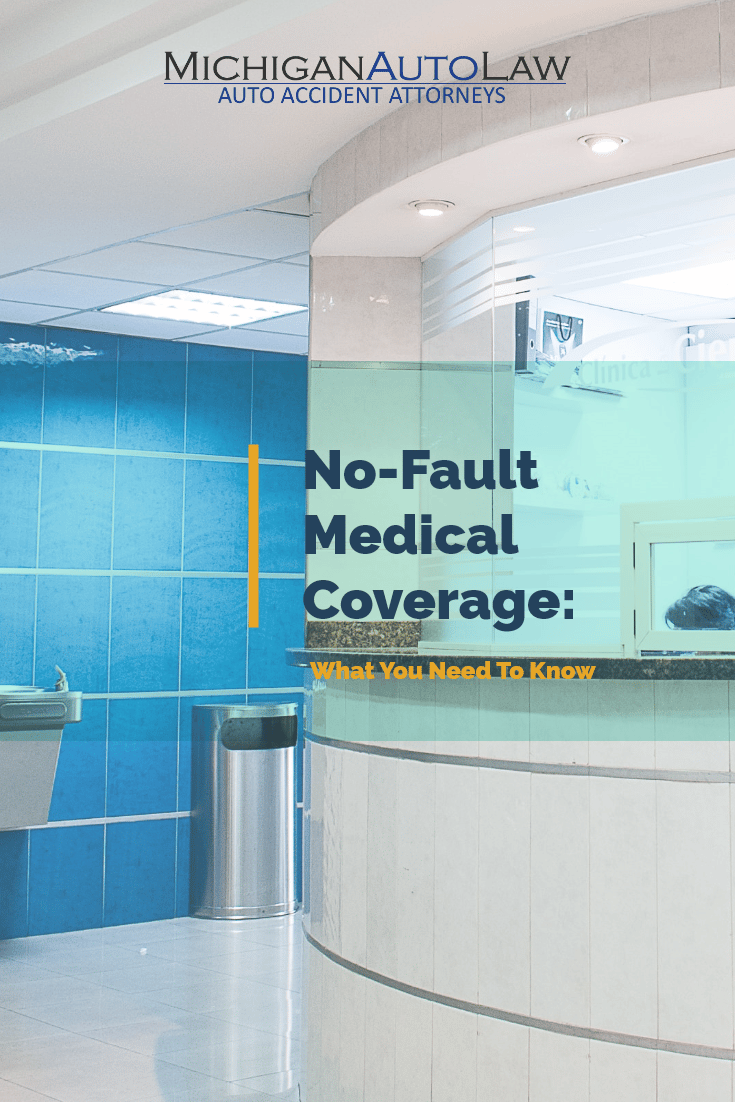No-Fault Medical Coverage: What You Need To Know

No-Fault medical coverage is one of the PIP benefits that car accident victims are entitled to under Michigan law. It pays for a victim’s accident-related expenses for treatment up to the PIP benefits coverage level selected in the victim’s auto insurance policy.
How much No-Fault medical coverage do I have?
A victim’s No-Fault medical coverage for car accident-related medical expenses is limited to the PIP medical benefits coverage level in the auto insurance policy through which he or she is claiming benefits. Prior to July 2, 2020, all drivers in Michigan had unlimited coverage.
Starting with car insurance policies issued or renewed after July 1, 2020, the coverage available for car accident-related medical expenses under the policy will depend on which of the following coverage levels were chosen by the driver who purchased the policy:
- $50,000 of coverage for medical expenses (if the driver/named insured on the policy is enrolled in Medicaid)
- $250,000 of coverage for medical expenses
- $500,000 of coverage for medical expenses
- Unlimited coverage for medical expenses
- No coverage for medical expenses (if the driver/named insured on the policy has Medicare and elected to opt-out of coverage altogether)
Michigan’s law on “priority” rules determine which auto insurance company pays for a car accident victim’s coverage.
What if No-Fault medical coverage doesn’t cover all of my expenses?
If your car accident-related medical expenses exceed the PIP benefits coverage level in the policy through which you are claiming this coverage, then you can sue the at-fault driver for “excess” medical benefits.
Alternatively, you may seek medical coverage through private health insurance, Medicaid or Medicare.
What does No-Fault medical coverage pay for?
Subject to the coverage level in the policy, this coverage pays for a car accident victim’s reasonably necessary medical care and treatment. This includes: doctor visits; hospitalizations; surgeries; procedures; diagnostic testing; rehabilitation; home and vehicle modifications; and medical equipment.
Importantly, this coverage pays for many services and treatment that are vital to a car accident victim’s care, recovery and rehabilitation that would not be covered (or coverage would be limited) under private health insurance. Those services and treatment include: (1) Residential care; (2) Attendant care by an agency; (3) In-home attendant care (24/7 is frequently prescribed for many TBI and SCI survivors); and (4) Long-term speech and cognitive therapy.
How do I make a claim?
To collect benefits for No-Fault medical coverage after you were injured in a car accident, you must file an application with the applicable auto insurance within ONE YEAR from the date of your car accident. (MCL 500.3145(1))
If you fail to file your application (which is also called an “application for No-Fault benefits” or “notice of injury”) on time – within one year from the date of your car accident – then you will forever lose any benefits to which you might be entitled.
Who pays for my coverage?
If you have your own auto insurance policy in which you are the “named insured,” then your own auto insurer will pay for your No-Fault medical coverage.
Otherwise Michigan law’s on “priority” rules will determine what insurer is responsible. Generally – albeit subject to certain exceptions – if you don’t have a policy, then the applicable insurance company to pay your coverage will be your spouse’s insurer or the insurer for a family member who lives with you.
If you don’t have coverage through any of these sources, then you will file your application for PIP benefits with the Michigan Assigned Claims Plan and they will assign an auto insurance company to pay for your benefits.
When is No-Fault medical coverage paid?
Your auto insurance company is supposed to pay your accident-related medical bills within 30 days of receiving “reasonable proof” of what is owed. (MCL 500.3142(2)) If your auto insurance does not pay, then the unpaid bills are deemed to be “overdue.”
However, if it’s an outstanding medical bill that you would like paid and you don’t give the bill to your insurer within 90 days of your care or treatment, then the auto insurance company has an extra 60 days to pay. (MCL 500.3142(2) and (3)) If the insurance company doesn’t pay on time, then your unpaid PIP benefits are considered “overdue.”
Lawsuit for unpaid medical bills
You can sue your auto insurance company for unpaid, overdue medical bills, but your lawsuit must be filed within one year from the date that the medical bill was incurred, otherwise you will lose your legal rights to sue to get recover the unpaid, overdue PIP benefits. (MCL 500.3145(2)) The one-year “period of limitations” is “tolled” from the date a claim is made “until the date the insurer formally denies the claim.” (MCL 500.3145(3))
Injured and need a lawyer? Call Michigan Auto Law
If you have been injured in a car accident and you have questions about your legal rights to Michigan No-Fault medical coverage, you can call toll free anytime 24/7 at (800) 968-1001 for a free consultation with one of our experienced auto accident attorneys. You can also get help from an experienced accident attorney by visiting our contact page or you can use the chat feature on our website.






